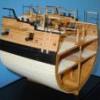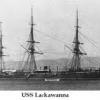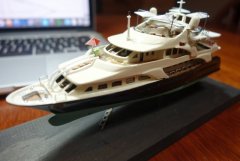-
Posts
1,267 -
Joined
-
Last visited
Reputation Activity
-
 AnobiumPunctatum got a reaction from wyz in Greenwich Hospital barge of 1832 by druxey - FINISHED - 1:48 scale
AnobiumPunctatum got a reaction from wyz in Greenwich Hospital barge of 1832 by druxey - FINISHED - 1:48 scale
It's not model building, it's an art. Every step so clean and crisp. There I have a lot to learn
-
 AnobiumPunctatum got a reaction from mtaylor in Greenwich Hospital barge of 1832 by druxey - FINISHED - 1:48 scale
AnobiumPunctatum got a reaction from mtaylor in Greenwich Hospital barge of 1832 by druxey - FINISHED - 1:48 scale
It's not model building, it's an art. Every step so clean and crisp. There I have a lot to learn
-
 AnobiumPunctatum got a reaction from dvm27 in Greenwich Hospital barge of 1832 by druxey - FINISHED - 1:48 scale
AnobiumPunctatum got a reaction from dvm27 in Greenwich Hospital barge of 1832 by druxey - FINISHED - 1:48 scale
It's not model building, it's an art. Every step so clean and crisp. There I have a lot to learn
-
 AnobiumPunctatum got a reaction from Canute in Greenwich Hospital barge of 1832 by druxey - FINISHED - 1:48 scale
AnobiumPunctatum got a reaction from Canute in Greenwich Hospital barge of 1832 by druxey - FINISHED - 1:48 scale
It's not model building, it's an art. Every step so clean and crisp. There I have a lot to learn
-
 AnobiumPunctatum reacted to druxey in Greenwich Hospital barge of 1832 by druxey - FINISHED - 1:48 scale
AnobiumPunctatum reacted to druxey in Greenwich Hospital barge of 1832 by druxey - FINISHED - 1:48 scale
Three strakes a side completed now. Rubber bands and small soldering clips make fine hold-downs while roughly shaped planks are drying out.
-
 AnobiumPunctatum reacted to tadheus in La Salamandre by tadheus - 1:24
AnobiumPunctatum reacted to tadheus in La Salamandre by tadheus - 1:24
Continuation.
The beginning of the relation is available at this address:
http://5500.forumact...ndre-1-24#66516
Regards, Paul
-
 AnobiumPunctatum reacted to tadheus in La Salamandre by tadheus - 1:24
AnobiumPunctatum reacted to tadheus in La Salamandre by tadheus - 1:24
Continuation.
The beginning of the relation is available at this address:
http://5500.forumact...ndre-1-24#66516
Regards, Paul
-
 AnobiumPunctatum reacted to tadheus in La Salamandre by tadheus - 1:24
AnobiumPunctatum reacted to tadheus in La Salamandre by tadheus - 1:24
Continuation.
The beginning of the relation is available at this address:
http://5500.forumact...ndre-1-24#66516
Regards, Paul
-
 AnobiumPunctatum reacted to Matrim in HBMS Amphion 1798 by Matrim - 32 Gun 18pdr Frigate
AnobiumPunctatum reacted to Matrim in HBMS Amphion 1798 by Matrim - 32 Gun 18pdr Frigate
So onto the actual work. After a lot of test cuts I secured my keel as follows
with a piece underneath and two on either side (to allow the drill close access otherwise
the vice jaws would interfere).
The drilling pattern was as follows
Centralise on left joint and upper false keel.
Move up 1.42 mm
Move right 6.41mm
Drill the first hole
Reset the mill to Zero.
Move right 6.41mm
Drill
Move right to 9.22mm
Drill
Move left to 0 and keep going slightly so I move over
the first hole and then back onto it (to sort out the mill backtrack)
Test hole location
Move up 1.42mm
Drill
Move right 4.61mm
Drill
Move right to 9.22mm
Drill
Rinse and repeat for all the holes.
I am happy with the results which I feel can be improved on for more visible joints
later on. One fortunate fact of the early keel work is that most of it (and the frames) will
be hidden so practice can be perfected before hitting stuff that can be seen.
Anyhow. Once I was happy with the joints it was time to add the copper wire.
These were inserted in one way with glue, removed, glue removed from the wood and then inserted
in the other. I may have to find a better way as glue still managed to escape so a better
process will be needed later.
Once glues the copper was then snipped low (note the glue that still got out)
before one side was carefully filed to close to flat.
I then used a quick jig to tidy up. I chiseled a small square out of a flat piece of wood (the size
of the joint and bolts) and the placed the joint I was working on over this hole. Two pieces of the
same size as the keel then surrounded my keel and were secured. If my filing then became to aggressive or
off center then the surrounding pieces would get damaged and the keel should be okay.
Results were 'shiny'.
Next up I have to decide whether to
A - Add the deadwood where I can
B - Add the lower stem (and equivelant rear) then taper the keel and stem and rear
C - Add the lower and upper stem (and so on) and THEN taper the keel.
All I am certain is that I dont want to cut the rabbett until the deadwood is on but the deadwood needs
the lower stem at least which would argue for B. But lots of people seem to do the entire stem and then
taper....Not at all certain so any advice would be welcome.
Thanks for reading.
-
 AnobiumPunctatum got a reaction from wyz in English Pinnace by BRiddoch - scale 1/2" = 1'
AnobiumPunctatum got a reaction from wyz in English Pinnace by BRiddoch - scale 1/2" = 1'
This looks really interesting. I've the same kit in my stock and like to change the timber.
I'll follow with great interest.
-
 AnobiumPunctatum got a reaction from mtaylor in Trehantiri by mhmtyrl - FINISHED - traditional Greek sponge diving boat
AnobiumPunctatum got a reaction from mtaylor in Trehantiri by mhmtyrl - FINISHED - traditional Greek sponge diving boat
Really nice old boat. Well done
-
 AnobiumPunctatum got a reaction from mtaylor in English Pinnace by BRiddoch - scale 1/2" = 1'
AnobiumPunctatum got a reaction from mtaylor in English Pinnace by BRiddoch - scale 1/2" = 1'
This looks really interesting. I've the same kit in my stock and like to change the timber.
I'll follow with great interest.
-
 AnobiumPunctatum reacted to druxey in Greenwich Hospital barge of 1832 by druxey - FINISHED - 1:48 scale
AnobiumPunctatum reacted to druxey in Greenwich Hospital barge of 1832 by druxey - FINISHED - 1:48 scale
The second strake is in on the port side. One can see the gain at the bow and stern, as well as how the boat keeps its shape when taken off the plug. From here on it is simply a matter of spiling and shaping each plank as I work up (down!) to the sheer strake. All one need do is make sure to conform to the mark-out on the plug.
-
 AnobiumPunctatum got a reaction from Canute in English Pinnace by BRiddoch - scale 1/2" = 1'
AnobiumPunctatum got a reaction from Canute in English Pinnace by BRiddoch - scale 1/2" = 1'
This looks really interesting. I've the same kit in my stock and like to change the timber.
I'll follow with great interest.
-
 AnobiumPunctatum got a reaction from Omega1234 in Trehantiri by mhmtyrl - FINISHED - traditional Greek sponge diving boat
AnobiumPunctatum got a reaction from Omega1234 in Trehantiri by mhmtyrl - FINISHED - traditional Greek sponge diving boat
Really nice old boat. Well done
-
 AnobiumPunctatum got a reaction from mhmtyrl in Trehantiri by mhmtyrl - FINISHED - traditional Greek sponge diving boat
AnobiumPunctatum got a reaction from mhmtyrl in Trehantiri by mhmtyrl - FINISHED - traditional Greek sponge diving boat
Really nice old boat. Well done
-
 AnobiumPunctatum reacted to mhmtyrl in Trehantiri by mhmtyrl - FINISHED - traditional Greek sponge diving boat
AnobiumPunctatum reacted to mhmtyrl in Trehantiri by mhmtyrl - FINISHED - traditional Greek sponge diving boat
lanterns for the boat :-)
mehmet
-
 AnobiumPunctatum reacted to mhmtyrl in Trehantiri by mhmtyrl - FINISHED - traditional Greek sponge diving boat
AnobiumPunctatum reacted to mhmtyrl in Trehantiri by mhmtyrl - FINISHED - traditional Greek sponge diving boat
manually operated air pump and diving helmet is ready :-)
-
 AnobiumPunctatum reacted to BRiddoch in English Pinnace by BRiddoch - scale 1/2" = 1'
AnobiumPunctatum reacted to BRiddoch in English Pinnace by BRiddoch - scale 1/2" = 1'
Using one of Chucks tips, I purchased some 1/16" striping tape (had to order it) and ran it down the center of the false keel. This left 1/32" on each side giving me a nice clean rabbet. From there I glued the keel and stem to the false keel. I can now dry fit the frames.
Bob R.
-
 AnobiumPunctatum reacted to druxey in Greenwich Hospital barge of 1832 by druxey - FINISHED - 1:48 scale
AnobiumPunctatum reacted to druxey in Greenwich Hospital barge of 1832 by druxey - FINISHED - 1:48 scale
Mark: if you have detail photos of the interior of the forward part of that vessel and near the tiller, posting those would be very helpful. Thanks for the kind offer.
Yes, these crafts were very lightly built but surprisingly strong. Think of them as predecessors of today's 'eights' rowing shells.
These two photos show how the lap disappears into the rabbet at the bow. The second strake also has a rolling bevel that fits the one on the edge of the first strake. You can also see that there is no gap along the lap, as the bevel that was sanded in takes care if this. PVA glue was applied with a very small brush and any excess cleaned up immediately.
-
 AnobiumPunctatum reacted to Mark P in Greenwich Hospital barge of 1832 by druxey - FINISHED - 1:48 scale
AnobiumPunctatum reacted to Mark P in Greenwich Hospital barge of 1832 by druxey - FINISHED - 1:48 scale
Greetings Druxey;
A clear explanation and a very useful tip. Many thanks for showing us. The photographs are a great help also. This will be a very interesting model to follow. It always seemed a miracle to me that these unseaworthy-looking vessels managed to stay afloat even in the relative calm of a river. They are lovely to look at, though.
Following on from Siggi's post above, I have some close up shots of the carving on Prince Frederick's barge in the NMM, which I have been intending to post on the contemporary models gallery. Some of these show the interior, although I had to take them through the glass, so they are somewhat obscured.
I can post them here as well, if you wish, or send them by PM or other method.
All the best,
Mark P
-
 AnobiumPunctatum reacted to druxey in Greenwich Hospital barge of 1832 by druxey - FINISHED - 1:48 scale
AnobiumPunctatum reacted to druxey in Greenwich Hospital barge of 1832 by druxey - FINISHED - 1:48 scale
Here are a couple of photographs of the land - the bevel - being sanded on the edge of the garboard and of the gain at the end of the rabbet (arrowed). The gain is basically a rolling bevel. It ends at 45 degrees so that the next plank will come in flush at the rabbet. Essentially clinker becomes carvel over the last 9" or 12" of the strake.
-
 AnobiumPunctatum got a reaction from Canute in Greenwich Hospital barge of 1832 by druxey - FINISHED - 1:48 scale
AnobiumPunctatum got a reaction from Canute in Greenwich Hospital barge of 1832 by druxey - FINISHED - 1:48 scale
Wonderful pictures and descriptions. I need also a clnker build boat for my sloop. So there is a lot to learn.
-
 AnobiumPunctatum got a reaction from mtaylor in Greenwich Hospital barge of 1832 by druxey - FINISHED - 1:48 scale
AnobiumPunctatum got a reaction from mtaylor in Greenwich Hospital barge of 1832 by druxey - FINISHED - 1:48 scale
Wonderful pictures and descriptions. I need also a clnker build boat for my sloop. So there is a lot to learn.
-
 AnobiumPunctatum reacted to Siggi52 in HMS Dragon 1760 by Siggi52 - FINISHED - Scale 1:48 - English 74-Gun ship
AnobiumPunctatum reacted to Siggi52 in HMS Dragon 1760 by Siggi52 - FINISHED - Scale 1:48 - English 74-Gun ship
Hello,
many thanks for your nice words and comments about my work.
Now day two after the ship is ready, I did't know really what to do. I sorted a little my shop, stored the machines, cleaned here and there the workbenches, but I missed the work! I have nothing to do
That where four years of searching, working and so on. Sleepless nights, when my brain started the day at two a clock with thinking over this or that, now I miss it. But I hope, after some times it will go away and life went on normal. May be next winter I start with the captains bark.
Regards,
Siggi








